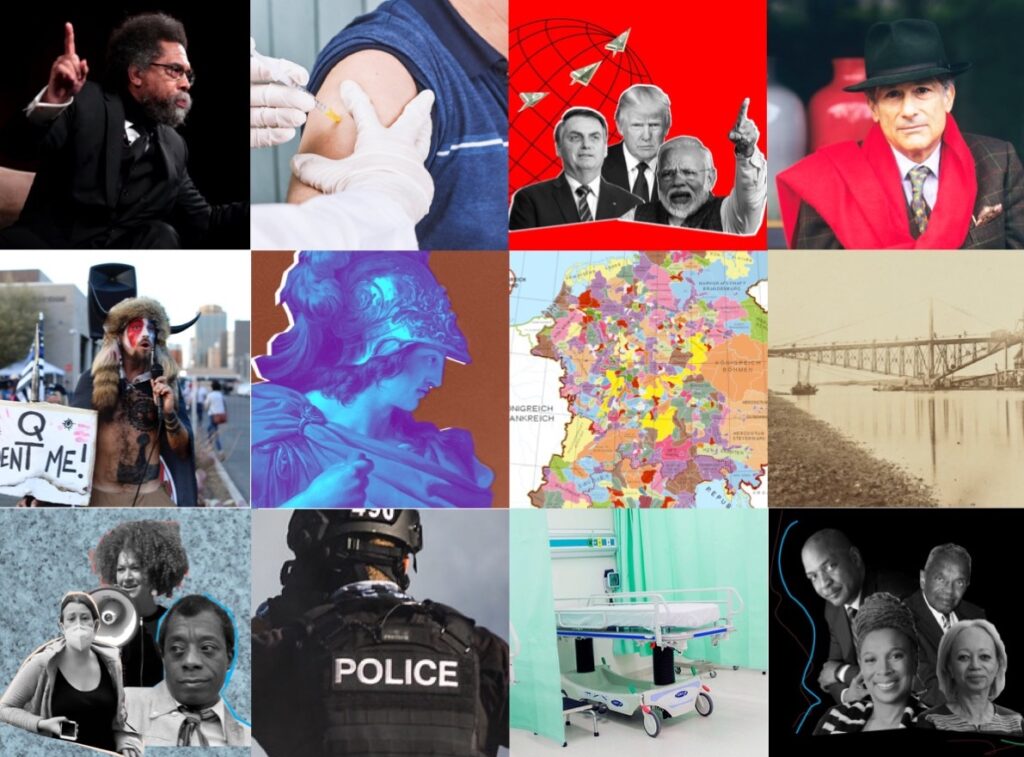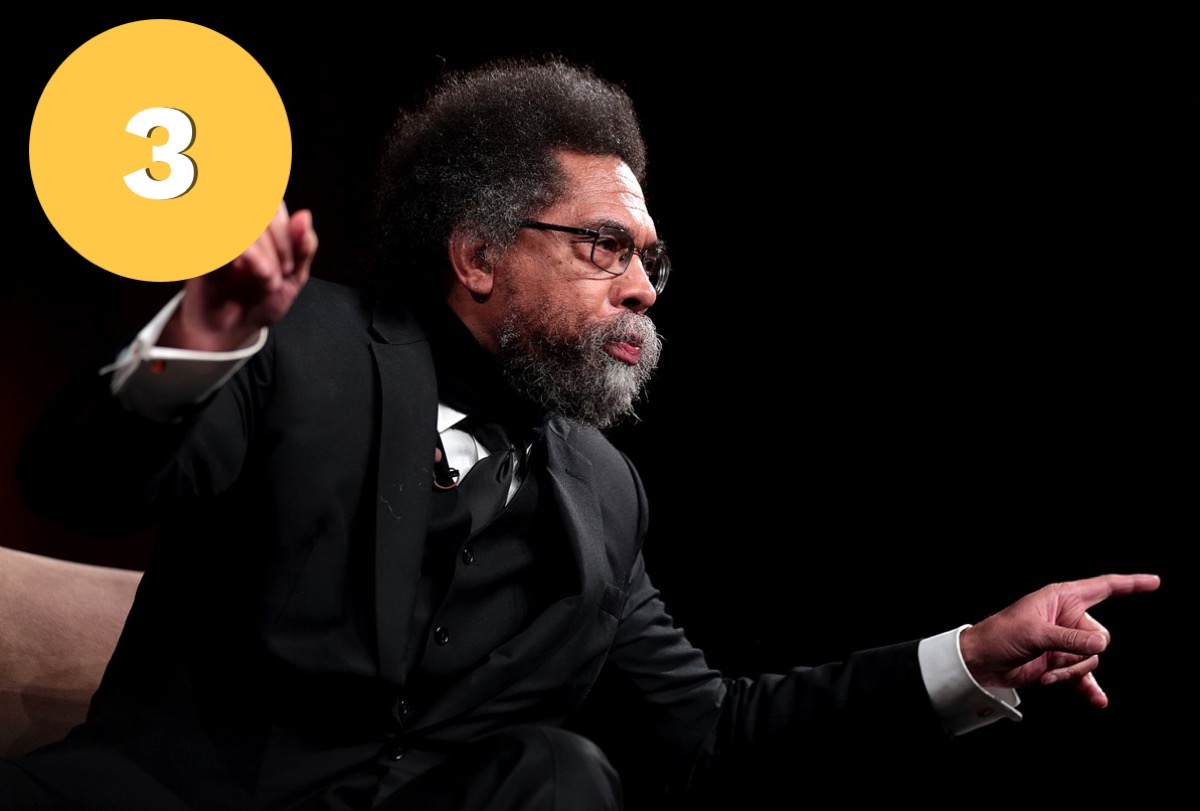This year began with hope for vaccines, a new U.S. president, and generally brighter days. But the January 6 attack on the Capitol quickly tarnished our optimism, and nearly a year later we find ourselves facing a holiday wave of soaring COVID-19 infections (again) and Biden’s Build Back Better plan dead in the water. It is really no surprise, then, that the Ever Given blocking the Suez Canal became the ship that launched a thousand memes, the perfect metaphor for lockdown torpor. But the Ever Given saga also shone a light on the colossal shipping industry behind global trade, whose pursuit of profit has long wreaked havoc on laborers and the seas they sail. “If . . . the Ever Given should teach us anything,” Charmaine Chua wrote in May, “perhaps it is that something monstrous has always been at work in the operations of global capitalism.”
Although our essays about coronaskepticism and epistemological crises were among our most read of the year, it wasn’t all doom and gloom: philosophy pieces also proved popular, including essays on persuasion and pleasure. Together the essays below constitute just a small selection from our output, with this year being one of our busiest ever. In addition to our new fellowship, revamped events series, and completely redesigned website, 2021 saw us publish 38 essays on race, 29 science pieces, 37 poems, and 31 contributions to our class and inequality section—not to mention hundreds more essays across our other categories and special projects.
Be sure to check out all of these offerings across the Boston Review site. But before you do, here’s what you loved most:
Race, Policing, and the Limits of Social Science
Studying the social world requires more than deference to data. In some cases, it may even require that we reject findings—no matter the prestige or sophistication of the technical apparatus on which they are built.
Lily Hu
Three new books explore the gap between sex that is good and sex that is virtuous, making the complexities of desire central to our conversations about sexual ethics.
Becca Rothfeld
The Ever Given and the Monstrosity of Maritime Capitalism
Two timely new books unmask the colossal shipping industry behind global trade, whose monstrous pursuit of profit has long wreaked havoc on laborers and the seas they sail through.
Charmaine Chua
We Don’t Know, But Let’s Try It
For economist Albert O. Hirschman, social planning meant creative experimentation rather than theoretical certainty. We could use more of his improvisatory optimism today.
Simon Torracinta
There is a cost to advancing caste as the preeminent analytic in place of race—we lose the precision that comes with naming our affliction a problem of anti-Blackness. We mistake the map for the territory, the skin for the bones, and the bones for the skin.
Panashe Chigumadzi
Whiteness Is the Greatest Racial Fraud
The Krugs and Dolezals dominate the headlines, but they are distractions from the fraud that imperils us all: believing oneself to be white.
Luvell Anderson
Arguments that kink has no place in a post-#MeToo Pride may appear reasonable, but celebrating public sexuality is an important step toward a future free of racism and homophobia.
Joseph J. Fischel
Why Neoliberalism Needs Neofascists
The neofascist assault on democracy is a last-ditch effort on the part of neoliberal capitalism to rescue itself from crisis. The only solution is a decisive retreat from globalized finance.
Prabhat Patnaik
The United States Is Not “a Nation of Immigrants”
Celebrations of multiculturalism obscure the country’s settler colonial history—and the role that immigrants play in perpetuating it.
Roxanne Dunbar-Ortiz
At a time of anxiety about fake news and conspiracy theories, philosophy can contribute to our most urgent cultural and political questions about how we come to believe what we think we know.
Michael Patrick Lynch
The Radical Promise of Human History
A sweeping new history of humanity upends the story of civilization, inviting us to imagine how our own societies could be radically different.
Emily Kern
Conspiracy theories like QAnon are ultimately a social problem rather than a cognitive one. We should blame politics, not the faulty reasoning of individuals.
Nicolas Guilhot
Attempts to cast Said as the consummate New York intellectual miss the point that his milieu was one of global, and specifically Palestinian, anticolonial struggle.
Esmat Elhalaby
Knowing takes radical collaboration: an openness to being persuaded as much as an eagerness to persuade.
Agnes Callard
Sovereign states have been mythologized as the natural unit of political order. History shows how new they are—and how we can think beyond them.
Claire Vergerio
Coronapolitics from the Reichstag to the Capitol
Defying conventional political labels and capitalizing on widespread distrust, a range of new movements share the conviction that all power is conspiracy.
William Callison & Quinn Slobodian
An Antiracist Agenda for Medicine
Colorblind solutions have failed to achieve racial equity in health care. We need both federal reparations and real institutional accountability.
Bram Wispelwey & Michelle Morse
Why Cornel West’s Tenure Fight Matters
I wrote letters for West’s hire and renewal at Harvard. The school’s administrators completely miss the point of tenure.
Robin D. G. Kelley
The War on Critical Race Theory
Turning a blind eye to the realities of racial injustice, the highly orchestrated right-wing attacks cast a body of scholarship about race in the law as a great threat to American society.
David Theo Goldberg
The Long-Term Safety Argument over COVID-19 Vaccines
Concerns about long-term side effects have helped fuel vaccine hesitancy. An immunologist explains why we can be confident in vaccine safety.
Andrew L. Croxford




























